Life for LGBTQ+ individuals in traditional societies especially in Afghanistan is extremely difficult. Even before the Taliban came to power, the country was not a safe place for queer individuals, but since the Taliban’s return, their lives have become increasingly dangerous. LGBTQ+ people in Afghanistan not only lack space to grow and live freely, but are also forced to hide their identities and face constant threats from society. Those who try to flee the country often face obstacles from the Taliban, including detention and imprisonment.
Parwin Hosseini, a 20-year-old lesbian Afghan, recently fled the country. Born in Ghazni and raised in Kabul, she spent years trying to hide her sexual orientation and gender identity from friends and even family. Eventually, she came to terms with her feelings toward someone of the same gender. In 2020 about a year before Kabul fell to the Taliban she met a girl named Maryam and fell in love. Entering a same-sex relationship meant accepting immense risks. Parwin recalls:
“When I asked Maryam to be in a relationship, she said yes. But we both knew from the start it wouldn’t be easy. Some of my friends judged me, some abandoned me, and others tried to convince me to stop. But the worst reaction came from my mother she no longer saw me as her daughter.”

Despite the backlash and opposition from their families, Parwin and Maryam continued their relationship and endured the social stigma. However, Afghanistan’s political situation deteriorated more quickly than they anticipated. Just a year into their relationship, in 2021, the Taliban regained control, and life became even more dangerous for LGBTQ+ people. Restrictions tightened, and the constant fear of arrest or execution loomed over them.
Parwin says: “Even before the Taliban, we lived in fear, but at least the previous government wasn’t actively hunting us. Under the Taliban, even holding Maryam’s hand on the street could get us killed. They created laws that directly targeted us. I received many threatening messages and knew that if I were arrested, I’d either be stoned or sentenced to death.”
Nearly four years after the Taliban’s takeover, Parvin and Maryam decided to flee for their safety and to be together. They hoped to reach a European country and get married. Eventually, they connected with Roshaniya, an LGBTQ+ support network led by Nemat Sadat, and found a way to escape. Parwin convinced her family she was going to Iran for studies, though in reality, she planned to leave Afghanistan permanently. But at the last moment, Maryam was detained by Taliban intelligence officers.
Parvin recounts: “When I left Kabul airport, I knew there was no going back. After my family learned I had fled, they cut all ties. During the escape, every moment felt like a risk. If the plane had been delayed by even five or ten minutes, I might have been caught.”
According to Parvin, Maryam was identified and arrested at the airport. Taliban officers examined her phone and discovered her romantic relationship with Parvin. She was imprisoned:
“They took Maryam, opened her phone, and found out we were a lesbian couple. There was no way to save her. They took Maryam from me, and I don’t know if she’s still alive.”
Parwin is now in Iran, a country with similarly strict laws where LGBTQ+ individuals also live in hiding. Still, she’s grateful to have escaped the Taliban and to be in a relatively safer place. Her main concern now is Maryam, who remains in Taliban custody and was unable to flee.
Nemat Sadat, an LGBTQ+ rights activist and head of the Roshaniya network, says Parvin (20) and Maryam (19) were scheduled to fly from Kabul to Tehran on March 20, 2025, with support from the network. Parvin made it out, but Maryam was arrested at the airport. Another queer person, Abdul Ghafour Saberi, was also detained alongside Maryam.

Sadat fears that the Taliban may use intimidation to extract information about other queer individuals, putting more lives at risk. He urges human rights organizations, especially Human Rights Watch and Amnesty International, to increase pressure on the Taliban to release the detained and protect LGBTQ+ rights in Afghanistan.
Maryam is not the only queer person who lived in hiding for years and was imprisoned while attempting to leave. Thousands of others face similar fates—either in hiding within a repressive society or behind bars. Among all the suffering Afghan citizens endure, LGBTQ+ people remain one of the most vulnerable groups. Since the Taliban’s return—now entering its fourth year—LGBTQ+ individuals have faced widespread violence and abuse, including arbitrary arrests, torture, rape, and mysterious killings.
Diana Danishvar, another LGBTQ+ rights activist, warns of sexual violence and even murder in Taliban prisons:
“The Taliban not only detain LGBTQ+ people, but in some cases use them as sex slaves. Some individuals have been arrested for their sexual orientation, raped, and then mysteriously killed. Their bodies are often found dumped in remote areas.”
The situation for Afghan LGBTQ+ people who have fled to neighboring countries like Iran and Pakistan is also dire. Danishvar says:
“A friend of mine in Iran told me about the economic hardships and the constant fear of being deported back to Afghanistan. In Pakistan, the situation is equally terrifying, and many live in fear and insecurity.”
While Afghanistan has never been a safe place for LGBTQ+ people, the Taliban’s rule has brought even harsher laws and punishments. Under Afghan law, same-sex relationships have always been criminalized, but now those who are exposed face punishments like stoning or execution by wall collapse.




